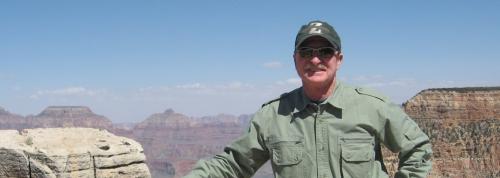
Ricord Torgerson
When Retired Colonel Ricord Torgerson (B.S. ’80, D.V.M. ’82, M.P.V.M. ’82) graduated from the UC Davis School of Veterinary Medicine, he could hardly have predicted where his Doctorate of Veterinary Medicine and Masters in Preventive Veterinary Medicine degrees would take him – halfway across the world to help people living in conflict zones.
Originally from San Diego, Dr. Torgerson says he was hardly considered “most likely to succeed” in high school. After taking some time off from schooling, he worked his way through community college and eventually transferred to UC Davis to complete his bachelor’s degree. He had never been a front-row student, but completing UC Davis’ dual D.V.M.-M.P.V.M. degree program helped set him on the path to a fulfilling and successful career.
The M.P.V.M. gave him a unique edge when applying for zoological medicine residency programs, positioning him as one of the only zoo vet hopefuls trained in epidemiology and herd health. He was accepted into a residency program at the University of Guelph and the Toronto Zoo, and from there went on to a successful career as a zoo veterinarian and executive.
Ten years after obtaining his dual D.V.M. and M.P.V.M. degrees, Dr. Torgerson joined the army as a reservist in the Veterinary Corps. “I joined the Army later in life as a reservist because I felt I had something to offer,” he said.
The corps recruits veterinarians to help ensure food safety for troops around the world, care for military animals, and conduct humanitarian missions supporting education, public health, preventative medicine, and other needs. As a reservist, he spent one weekend a month plus several weeks annually serving in the Veterinary Corps, allowing him to continue his career in zoo medicine. Over the course of his 26-year military career, Dr. Torgerson rose to the rank of Colonel and retired as a decorated veteran.
In 2006, he got the call that would change his life. He was transferred out of the Veterinary Corps and into the Army’s Civil Affairs Branch – he was being deployed to Iraq. The opportunity offered an exciting chance to apply his unique skillset in One Health, epidemiology and herd health to provide humanitarian assistance, liaise with foreign governments and NGOs, and assist in reconstruction efforts in warzones.
“At first they didn’t know what to do with me,” Dr. Torgerson said. “But, a commanding officer recognized that a person with a population medicine background would be a good fit for the public health director position they had. He appreciated my herd health attitude and broad medical background.”
Dr. Torgerson would spend the next seven years living in Iraq and Afghanistan helping provincial leaders improve their governance skills and supporting public health, education, and reconstruction.
In the public health sector, his work met urgent needs identified by local leaders. He supported the formation of a national professional organization to improve prosthetics and care for amputees, established and funded a provincial EMT First Responder training program, secured funding for hospitals to install life-saving facilities such as a cardiac surgery unit, and developed training programs for doctors and nurses.
On the education front, he worked closely with provincial leaders to bring education to remote regions. Dr. Torgerson did everything from helping fine-tune grant proposals, to securing safe transportation for education officials to Baghdad where they could lobby their government, a critical need as roadside bombs were all too common. With his support, Ninewa Province received 3,700 additional teaching positions funded by the Iraq Federal Government.
His time in Iraq and Afghanistan was dangerous but rewarding. He spent much of his time building trust with local leaders by listening to their needs and insights and working to incorporate public health and education into missions run by other units in the Army. “I took any mission I could get a hold of with anyone who would let me, with the idea that I could learn and get health into it,” Dr. Torgerson said.
He returned to the United States from Afghanistan in 2014 and now works for the Washington State Department of Agriculture as a field veterinarian, working with food producers and vets to ensure food safety and support the state’s economy. Now retired from the Army, he continues to think about ways he can apply his skills to serve others and pay forward the opportunities he received as a result of his time at UC Davis.
“[The M.P.V.M. degree] got me opportunities that I never expected, that I couldn’t predict, where you can use your talents in a way you never thought about in the past,” Dr. Torgerson said.
